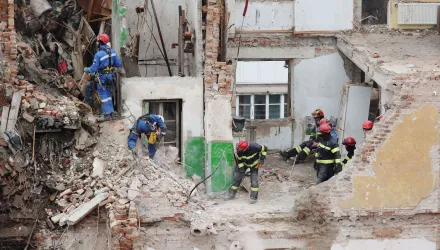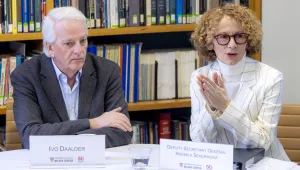
With Russia's war against Ukraine grinding past the one-year mark, the Belfer Center's Russia Matters team has redoubled its efforts to analyze the drivers and consequences of the conflict. Over the course of 2023, according to analysis published on the RM website, we may see a fundamental tension come to a head: On one hand, economists say Moscow has plenty of money to keep on fighting—and, at the same time, domestic politics not only in Russia but in Ukraine and the U.S. encourage a continued war of attrition, not a negotiated settlement. On the other hand, while experts debate the true costs of continued Western support for Kyiv, public opinion polls show that ordinary people in the West are increasingly skeptical about keeping up military aid at the current pace.
However this tension plays out, developments on the battlefield are now easier to track with the weekly Russia-Ukraine War Report Card put together by Prof. Graham Allison's Russia-Ukraine War Task Force. The report card shows who's losing and winning territory, as well as a wealth of other data, including casualty figures, civilian displacement, loss of materiel, and impacts on economy, infrastructure, and popular support on both sides. Military analysts from Taiwan to Germany are keeping a close eye on all these developments, trying to assess what lessons their countries' armed forces can draw.
Those hoping to draw lessons about Vladimir Putin's decision-making will want to read the latest research on Russian military interventions by RM founding director Dr. Simon Saradzhyan. Why did Russia's current dictator opt for a full-blown invasion of Ukraine despite reams of publicly available evidence that conquest would be no mean feat? Rather than be guided by our own ideas of "common sense," we must ask what costs and benefits Putin saw in each of the policy options available to him, no matter how misinformed he may be. The author concludes that a confluence of three factors likely compelled Putin to invade Ukraine in 2022: First, the Russian president seems to have believed that changes in Ukraine and in its relations with the West over the past few years posed newly acute threats to Russia's vital national interests as he sees them and wanted to prevent Ukraine's "escape" to a hostile camp. Second, he may have believed that he had run out of non-military options for responding to these threats. And, third, Putin thought he had a reasonable chance that the war would succeed.
RM's authors have likewise explored what might happen after the war. A former NATO ambassador writes that the West will have to provide Ukraine with "bespoke, fool-proof international security guarantees" by an ad hoc group of countries, while pragmatically engaging Russia on arms control and establishing a safety net of confidence-building measures. Two international-law scholars, meanwhile, explain what options there are for prosecuting war crimes committed in Ukraine and how the International Criminal Court's arrest warrant for Putin would actually work. In the former case, the crime of aggression—that is, the invasion itself—will be the most difficult to prosecute and the best hope for justice thus lies in creating a new tribunal. In the latter, key challenges will arise from Putin's status as a head of state, which does not give him immunity before international courts but could make arresting him very tricky.
FEATURED IN THE SPRING 2023 NEWSLETTER
Russia Matters Staff. “Russia-Ukraine War in the Spotlight.” Belfer Center Newsletter, Belfer Center for Science and International Affairs, Harvard Kennedy School. (Spring 2023)





